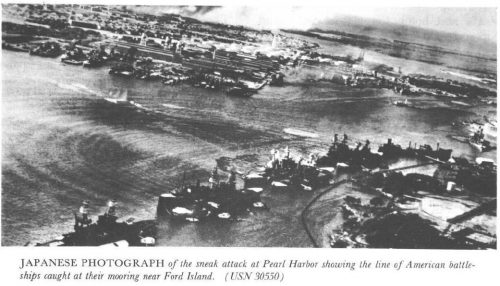In the wake of Ebola, NVD-68, and Zika, we should have all learned our lesson by now. We haven’t. This is 2020—Iowans took a week to count the votes of 5% of their population, and an elderly white Northeastern president is principally opposed by a gaggle of downright ancient white Northeasterners. There aren’t any quick fixes for emergent idiocies like those, but a few simple heuristics will go a long way toward avoiding panic over coronavirus.
International Affairs
The Forgotten and Buried Intelligence Lessons of Pearl Harbor, December 7th 1941
December 7th 2019 is the 78th anniversary of the Imperial Japanese Navy’s surprise Pearl Harbor attack on the capitol ship battle line of the US Pacific Fleet. After that attack there was a round of American elite political and military leaders a collective swearing of “Never Again.” That is, “Never again will the USA be so surprised by a foreign enemy.”

Yet despite that, America has indeed been “surprised” in exactly the way of Pearl Harbor repeatedly since 1941. The Korean war is one example five years after WW2 ended. The Soviet Invasions of both Czechoslovakia and Afghanistan in 1968 and 1979 are two others It was certainly an intelligence surprise on 9/11/2001 with the attacks on the World Trade Center in NY City and the Pentagon in Washington D.C., and the “surprise” of there being few/no Weapons of Mass destruction in post 2003 Iraq, and Iran’s recent drone and cruise missile attack on Saudi Arabian oil refining facilities.
The reason for this pattern of failure boils down to the forgotten and unlearned — frankly impossible for American elites to learn — intelligence lessons of Pearl Harbor. Those unlearned lessons being that the interlocking patron-client political relations inside the American federal civil government, military and intelligence organizations lead to narrow self-interested group think over the concerns of outside reality. And that this tendency towards self-interested group think is at its absolute worse when facing a foreign enemy with a police state internal security system that is running a campaign of strategic deception and denial.
If that “worst case” foreign enemy sounds a lot like Imperial Japan, the People’s Republic of North Korea, China, the Soviet Union, Iraq and Iran. It means you have paid attention to both American history since Pearl Harbor and to current events.
Who’s Your Baghdaddy?
It is deeply, solidly ironic that at almost the very hour that US forces were bagging Abu Bakr al-Baghdadi, fearless leader of the ISIL/ISIS-established caliphate in the Middle East, that the catastrophically-unfunny cast of Saturday Night Live had just finished ragging on President Trump for supposedly coddling ISIS by pulling out of Syria. There hasn’t been a case of timing this bad since 70ies Weatherman terrorist-turned-educator Bill Ayres launched his memoir of bomb-building and social mayhem the very week that Osama Bin Laden’s merry crew of jihadis murdered nearly 3,000 Americans and others in a single day, on September 11th, 2001.
Ayiti Pa Nimewo Yo
I. Departure
Our transportation to Aéroport International Toussaint Louverture was a decrepit Honda Civic with no working inside door handles, no exhaust system, and a barely functional starter. The guesthouse driver poured a liter of water into the radiator immediately before starting the engine so that it would not overheat, even though the drive was only 3 kilometers. Our luggage proved too big for the trunk, so most of the team’s belongings were wedged in beneath the open trunk lid, which was not secured by so much as a single bungee cord. Threading through the remnants of at least a dozen barricades on Avenue Gerard Téodart half an hour before sunrise, we high-centered on some rubble and dragged a sizable rock for several hundred meters before the driver backed the car up to dislodge it. After we made the turn onto Boulevard Toussaint Louverture, there were no more barricades, thanks to the proximity of a MINUSTAH logistics base and a Police Nationale d’Haïti station. There were pedestrians, of course—Port-au-Prince is very much a city that never sleeps—but not many, and few vehicles thanks to severely interrupted fuel deliveries, which had nearly stranded us altogether. One of the team members riding in the back seat later told me that the gas gauge was on “E.”
What is happening when a Third World country loses a key component of its energy supply, and what might be the lessons to learn for those apprehensive over a significant breakdown of logistics in the US?
Manufacturing in the USA
A website devoted to that topic: Reshoring Manufacturing